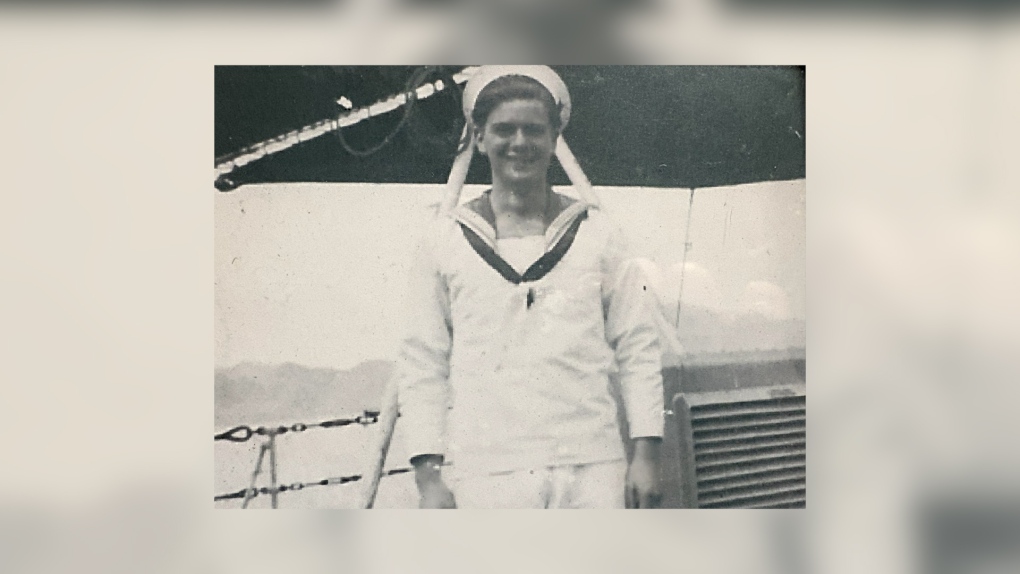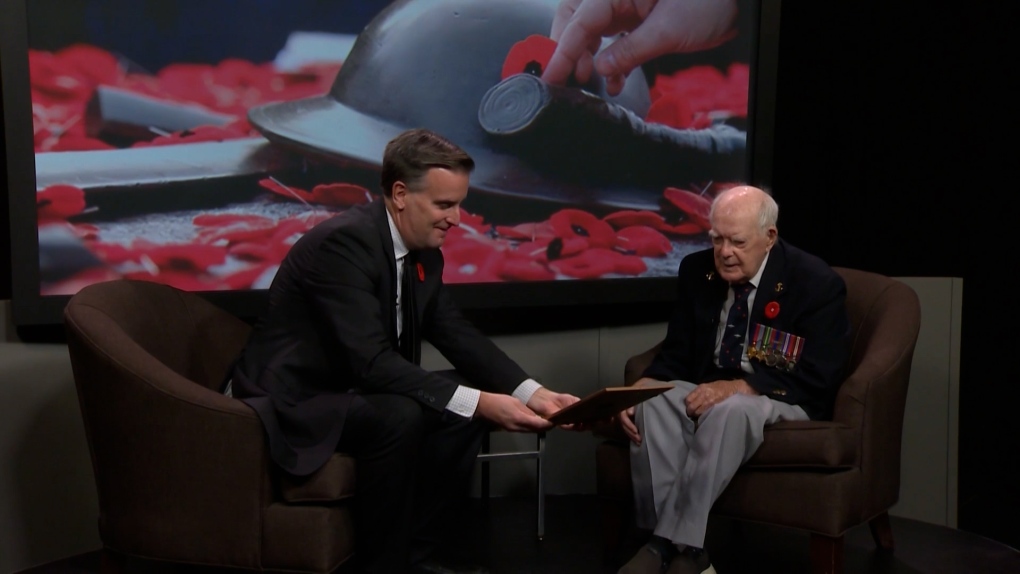Battling the memories: Local war veteran speaks about his time in the Second World War
Like many veterans of the Second World War, Allan Brunsden came to terms with his battle memories late in life.
At 99, he keeps his therapy dog ‘Bo’ close by in case his recollections get the better of him.
“The nighttime is worse. It is a bad time for me. I have a lot of flashbacks during the night,” he told CTV News.
For Allan, vivid memories of battle come from a long tour at sea in 1945. Combat was so intense that 18-year-old Alan penned a farewell note.
“So, I wrote a letter to my mother. I remember that clearly, and I told my mother I loved her and that I was afraid I was not going to return.”
Allan's war-time story had begun long before he shipped out.
The Brantford-raised son of a wounded Great War veteran, enlisted in the Royal Canadian Navy in London, Ont. to avoid the fate of foot soldiers he had read about in the newspapers.
“There would be a picture of one of the servicemen that was killed. And every day I read about that. I think I decided that I didn't want my picture in there. So, it seemed very seldom did I see pictures of Navy people. So, I decided I was going to join the Navy. “
 Allan Brunsden is seen in this photo dated 1945. (Source: Submitted)Allan would train on smaller ships on the west coast before being shipped east to serve on the HMCS Uganda. He was overwhelmed by its size.
Allan Brunsden is seen in this photo dated 1945. (Source: Submitted)Allan would train on smaller ships on the west coast before being shipped east to serve on the HMCS Uganda. He was overwhelmed by its size.
“They drove us to the waterfront there and they jumped and, and they said, ‘There's a ship you're going to. I looked at it and, I said, “That's a bloody battleship!”
The Uganda would steam to northern Scotland before turning around and heading south.
At sea, Allan and the crew were told the destination – Imperial Japan.
They would arrive in April of 1945. Attached to the British Pacific Fleet, the Uganda would be the only Canadian warship to participate in the final battle with the Empire of the Sun.
“We put every confidence in our ship. We thought that we were invincible,” Allan recalled.
As the war in Europe ended Allan’s war was only beginning.
The crew of the heavily overcrowded Uganda would not wait long to see the enemy. Japanese pilots on a one-way trip, attacked the largely American fleet comprised of hundreds of ships — Uganda was not spared.
One morning, two kamikaze pilots had Allan's position on deck in their final flight crosshairs, he described with shaking hands nearly 80 years after it happened.
“I can recall two kamikaze planes coming at us. I was on fire control Amidship, and this one plane was coming towards us, but suddenly, at the last minute, it veered away.”
The planes had turned for larger ships where allied lives were lost.
Allan survived to witness farewells at sea.
“When we had to bury people at sea. This was so upsetting to me. And although I was not on the burial party, I was standing up on the upper deck, and I watched them take the coffin. It wasn't a coffin. It was just a board with his hammock wrapped around them. And it slid down off the quarterdeck. And that was so upsetting to me. “
Eight decades later, that upset has never left Allan. “I keep thinking about them, and you know, I think too much about them, and it's upsetting to me, and I, I try to put it out of my mind, but it's impossible,” he said.
Part Two
Sadly, the attacks from kamikaze aircraft did not let up.
Allan was aboard the HMCS Uganda when a Japanese Zero fighter aircraft appeared over the stern.
On this day, Uganda's defences failed.
“The pompoms were supposed to be opening fire, and they didn't,” said Allan.
In response, he witnessed an officer act out of desperation. He reached for his sidearm and began firing at the plane.
“He is up there with his with his ‘45 shooting this little gun. And that's how close this kamikaze came to us,” he said. “So, you're clearly seeing the markings on the plane.” Sean Irvine (L) speaks with Second World War veteran Allan Brunsden in November 2024. (CTV News file image)
Sean Irvine (L) speaks with Second World War veteran Allan Brunsden in November 2024. (CTV News file image)
Amazingly, Uganda was not struck. But, for Allan, the damage had already been done. His nerves were shot after endless months at sea.
“I was beginning to think that we've been down there for so long. And it was in my mind that I'm not going to survive,” he said through visible emotion. “I had that with me for quite some time, and I think that this is where I got PTSD.”
Of course, in 1945, PTSD was neither recognized nor treated. So, like many sailors, Allan buried his thoughts and moved on with life.
He married his wife Doris and raised two children.
The memories of war eventually overwhelmed him. In time, a diagnosis of PTSD was made. Allan was given a support dog and access to treatment at Parkwood Veterans Care. His mind eased.
“Still, at this time of year, I get very, upset is not the word, but, very uptight about it. And I do have to go to Parkwood Hospital at the clinic there for help, and I used to be ashamed of myself. I'm not ashamed now.”
It might be hard to imagine how a man, who has lived almost a century, is still impacted by a war long ago.
Allan hopes by sharing his story and his treatment, younger combat veterans find their path to ease their PTSD.
At the same time, he hopes Canadians remember the sacrifices of those who never had a chance to come home.
“Nov. 11 is a hard time for me. Exceptionally hard. I think about my friend Doug who was killed by the buzz bomb. And the one who was shot down in the Air Force. I think of those people,” he recalled solemnly.
And as he does, he warns today’s political leaders to remember what it was like to lose a generation to war.
“I think about that a lot. About, what life would be if they hadn't been killed? Would I still be friends with them? And I think that, you know, it was useless. It was something that should never have happened.”
CTVNews.ca Top Stories

LIVE @ 4:30 P.M. PT Downtown Vancouver stabbing suspect dead after being shot by police
A suspect is dead after being shot by police in a Vancouver convenience store after two people were injured in a stabbing Wednesday morning, according to authorities.
DEVELOPING As police search for suspect, disturbing video surfaces after U.S. health-care CEO gunned down in New York
UnitedHealthcare CEO Brian Thompson was killed Wednesday morning in what investigators suspect was a targeted shooting outside a Manhattan hotel where the health insurer was holding an investor conference.
'Utterly absurd': Freeland rebuffs Poilievre's offer of two hours to present fall economic statement
Deputy Prime Minister and Finance Minister Chrystia Freeland has rebuffed Conservative Leader Pierre Poilievre's offer to give up two hours of scheduled opposition time next Monday to present the awaited fall economic statement as 'utterly absurd.'
Transport Minister to summon airline CEOs as Air Canada set to charge carry-on fees for some passengers
Transport Minister Anita Anand says she will be calling Canadian airline CEOs to a meeting in mid-December after Air Canada says it will charge some passengers for carry-on bags in the new year.
Canada's new public-sector payment system is still years away from being implemented
After half a decade of testing and an investment of nearly $300 million, the federal government is still years away from fully implementing its next-generation pay and human resource cloud platform to replace the problem-plagued Phoenix payroll system.
WATCH: Suspects armed with hammers hit Markham jewelry store
Six suspects are in custody in connection with a smash-and-grab robbery at a jewelry store in a Markham mall that was captured on video.
Why are some Canada Post outlets still open during CUPW strike?
As many postal workers continue to strike across the country, some Canadians have been puzzled by the fact some Canada Post offices and retail outlets remain open.
French government toppled in historic no-confidence vote
French opposition lawmakers brought the government down on Wednesday, throwing the European Union's second-biggest economic power deeper into a political crisis that threatens its capacity to legislate and rein in a massive budget deficit.
Woman who stowed away on plane to Paris is back on U.S. soil
A Russian woman who stowed away on a Delta Air Line flight from New York to Paris last week has returned stateside Wednesday.
































